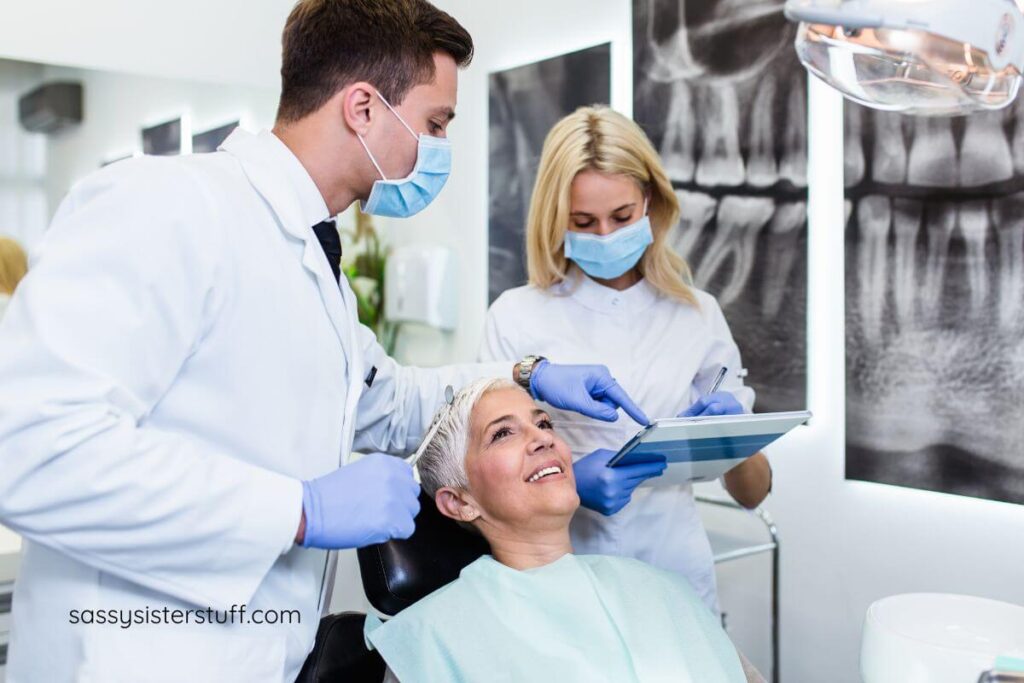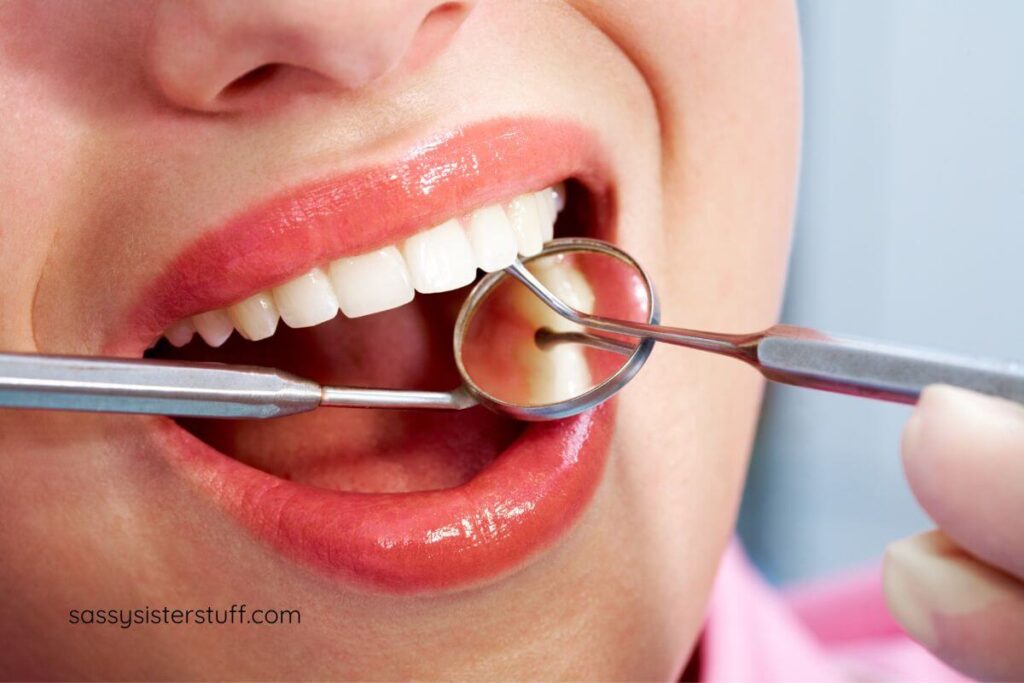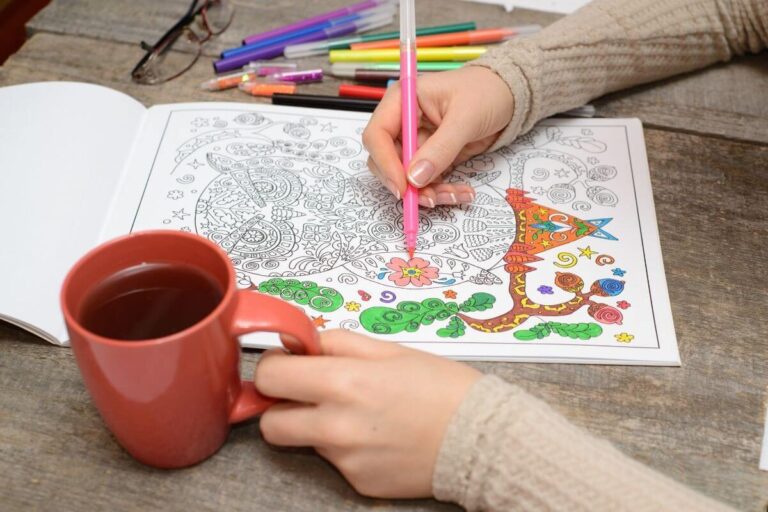Dental Hygiene Habits You Didn’t Know You Need After 60
As you might already know, getting older comes with its fair share of surprises and challenges. One day, it’s a sore knee after stepping off the curb wrong; the next, you need reading glasses just to see the microwave clock.
You’re trying to do what you can to have a better quality of life, but yeah, sometimes it can be a little tough with a new issue almost daily, right?
But dental issues? After all those years of brushing, flossing, and nodding politely through every lecture at the dentist’s office, you’d think the mouth would hold up its end of the deal.

That’s not something that most people expect to sneak up out of nowhere. But it does, and we need to consider some new and revised dental hygiene habits you didn’t know you need after 60.
Dental Hygiene Habits You Didn’t Know You Need After 60
As you age, teeth start to shift. They start to feel weird. Gums get more sensitive. Dental work from the 90s decides it’s had enough.
And suddenly, dental hygiene isn’t just about clean breath and healthy teeth. Overall, it’s about managing a whole new level of maintenance that nobody gave you a heads up on.
Taking care of your teeth and gums becomes even more important after 60.
Aging, medication use, and years of wear and tear can lead to new dental concerns that require special care. Here’s how to keep your smile healthy and strong as you age.

1. Managing Dry Mouth (Xerostomia) After 60
Are you waking up with a mouth that feels like it’s stuffed with cotton? Yeah, that’s not fun at all. Dry mouth is more than just a thirsty feeling.
Dry mouth is super common after a certain age, especially if there are medications involved. It actually messes with your oral health.
Saliva’s got a big job; it protects enamel, washes away food bits, and keeps everything balanced. So, without enough of it, teeth are more likely to decay, gums get irritated, and talking or eating just becomes difficult.
Sipping water or chewing sugar-free gum all day may feel like the best solutions, but ideally, it’s going to be worth seeing a dentist if it keeps happening.
Aging, medications, and health conditions can cause dry mouth, increasing the risk of cavities and infections.
How to Combat Dry Mouth
- Stay hydrated – Sip water throughout the day and avoid dehydrating drinks like coffee and alcohol.
- Use a saliva-boosting rinse or spray – Look for products with xylitol to help stimulate saliva and protect against cavities.
- Chew sugar-free gum or suck on lozenges – This encourages saliva production and keeps your mouth moist.
- Avoid mouthwashes with alcohol – Opt for an alcohol-free version with fluoride to prevent further dryness.
If dry mouth persists, a dentist may recommend prescription saliva substitutes or adjusting medications that could be contributing to the issue.

2. Preventing and Managing Receding Gums
As you age, gums slowly retreat, exposing tooth roots that were never supposed to see the light of day. And those roots? Well, you need to keep in mind that they’re sensitive.
But what’s the worst part of it all? It can start happening without even realizing it. Then one day it hits—teeth feel a little loose, that once-perfect bite is suddenly off, and chewing doesn’t feel quite right. Suddenly, you have gum disease!
It’s not just about appearances. Gum recession is a real issue that can affect how stable the teeth are.
Gum recession is common with age and can lead to sensitivity, loose teeth, and even tooth loss if left untreated.
Healthy Habits to Reduce Gum Recession:
- Use a soft-bristled toothbrush – Hard bristles can wear down your gum line over time. Switch to an ultra-soft brush or an electric toothbrush with a pressure sensor.
- Try gum-stimulating toothpaste – Some formulas contain ingredients like stannous fluoride to strengthen gums and reduce further recession.
- Floss gently but daily – Using a waxed or water flosser can help remove plaque without irritating sensitive gums.
- Increase Vitamin C and CoQ10 intake – Both are linked to better gum health and may slow recession.
If you notice significant gum loss, a dentist may suggest scaling and root planing or a gum graft to protect your teeth and roots.
3. Old Dental Work Doesn’t Last Forever
That crown from twenty years ago? It’s probably on borrowed time. Did you know that fillings, bridges, and dentures all have a shelf life? Yep, you read that right!
It can’t be stressed enough that regular check-ups catch this stuff early. It’s easier (and cheaper) to fix it before it turns into an emergency visit.
Fillings, crowns, and bridges don’t last forever! Over time, they can crack, wear down, or become loose, increasing the risk of decay or infection beneath them.
How to Maintain Old Dental Work:
- Get regular dental check-ups – Dentists can spot cracks or leaks before they turn into major problems.
- Watch for signs of trouble – Sensitivity, pain, or food getting stuck in certain areas might mean it’s time for a replacement.
- Upgrade materials if needed – Older silver fillings (amalgam) can expand and crack teeth over time. Composite or ceramic materials are often more durable and natural-looking.
- Use a nightguard if you grind your teeth – Grinding (bruxism) speeds up wear and tear on crowns, fillings, and bridges. A custom nightguard can protect your dental work.

4. Reducing Tooth Sensitivity
I’ve had a problem with my enamel since I was in my thirties. Apparently, it was not uncommon for pregnant mommas to be given the antibiotic, tetracycline, in the 1950’s.
Then, when I was a child, I was given the same medication for very high fevers. Unfortunately, it was later discovered that this medication causes tooth staining. So my teeth were pretty darn gray by the time I was in my fifties.
The enamel on my teeth was significantly damaged, and I experienced receding gums, tooth sensitivity, and unattractive teeth. Eventually I had crowns put on thirteen of my top front teeth. Soon I’ll have my bottom front teeth done. I’ve been lucky to have excellent dental care!
As enamel wears down and gums recede, many people experience increased tooth sensitivity to hot, cold, sweet, or acidic foods.
How to Soothe Sensitive Teeth:
- Use sensitivity toothpaste – Look for one with potassium nitrate or stannous fluoride to block pain signals and strengthen enamel.
- Avoid acidic foods and drinks – Citrus, soda, and even tomatoes can erode enamel, worsening sensitivity.
- Brush with a gentle technique – Over-brushing can strip enamel and irritate exposed roots. Use soft, circular motions.
- Consider fluoride treatments – A dentist can apply fluoride varnish or prescribe stronger fluoride toothpaste to help remineralize enamel.
If sensitivity worsens, it may indicate an exposed nerve, cracked tooth, or deep cavity, so don’t ignore ongoing discomfort!
5. Oral Cancer Awareness Over 60
I’ve had regular dental appointments every six months since I was 18-months old. Fortunately, any problems were discovered before they became BIG problems.
I have had just two dentists in my lifetime. One for the first 29 years of my life and one for the last 30+ years. Recently, my dentist has started looking for oral cancer during every visit.
He explains the risk of oral cancer increases in older adults, and many cases go undetected until they are advanced. Regular screenings can help catch it early.
Oral Cancer Prevention & Detection:
- Get routine dental check-ups – Many dentists check for oral cancer at regular visits, so don’t skip them.
- Watch for warning signs – Sores, red or white patches, lumps, or persistent pain in the mouth should be evaluated.
- Limit tobacco and alcohol use – Both significantly increase the risk of oral cancer.
- Maintain good oral hygiene – Keeping your mouth clean reduces the risk of infections and inflammation that may contribute to cancer development.
If you notice persistent pain, a sore that doesn’t heal, or difficulty swallowing, see a doctor or dentist right away.

Final Thoughts
Good dental hygiene habits you didn’t know you need after 60 goes beyond brushing and flossing—it’s about protecting your gums, staying ahead of dry mouth, keeping dental work in good shape, and being proactive about oral health issues.
A healthy smile can help you eat, speak, and feel confident at any age!
There are two additional tidbits of valuable information I want to share:
- Poor oral care and tooth decay can cause potential heart disease.
- Smoking causes significant oral health problems, so your dentist will likely recommend that you quit smoking.
Please talk to your doctor about these issues if they apply to you.
And start getting regular dental care before you’re an aging adult!
Related Articles:
Love to ALL! ~ Susan







